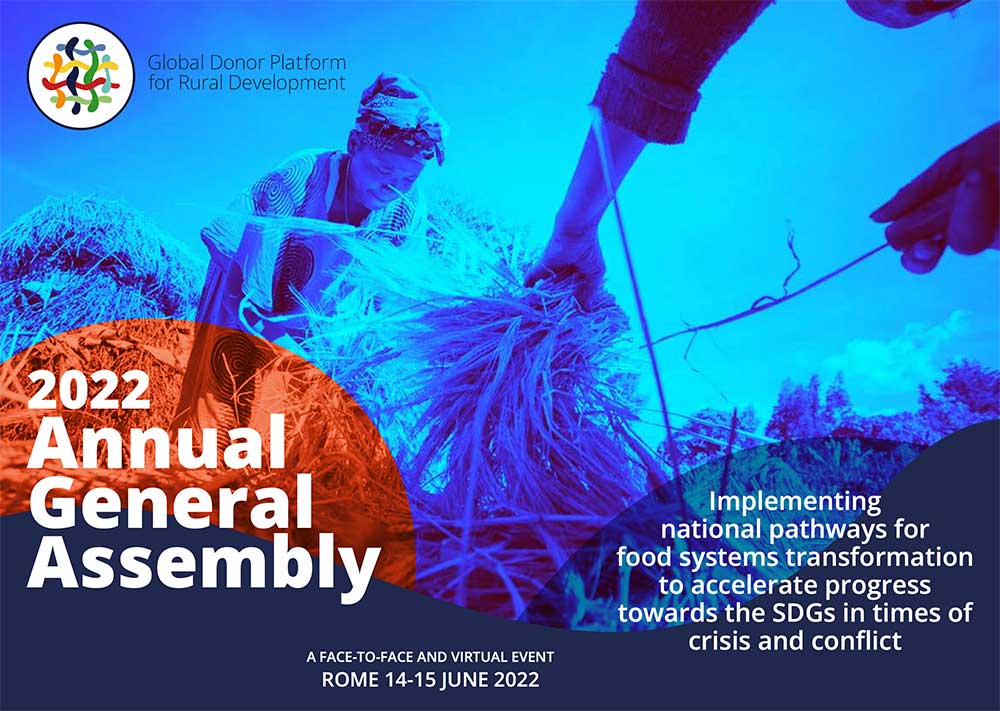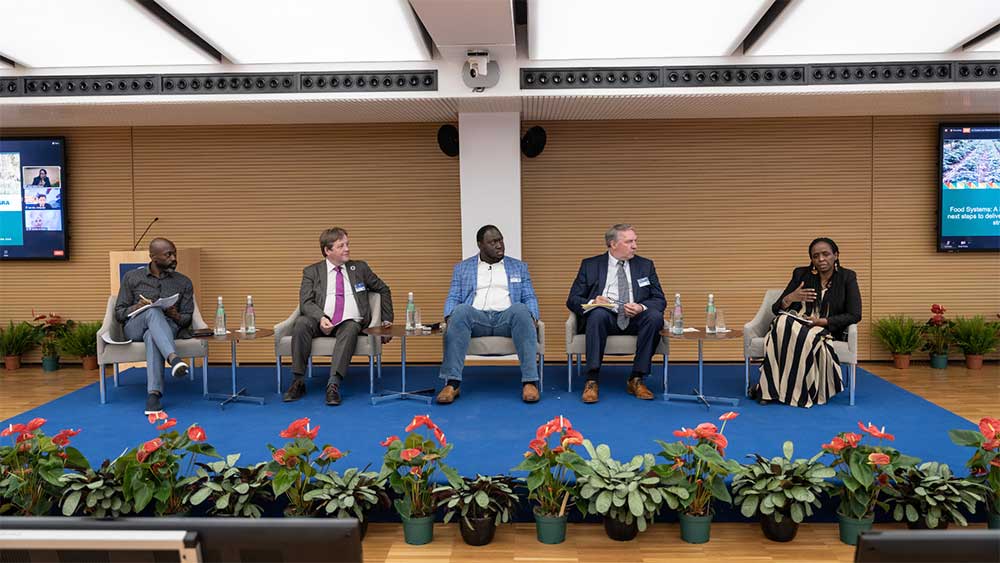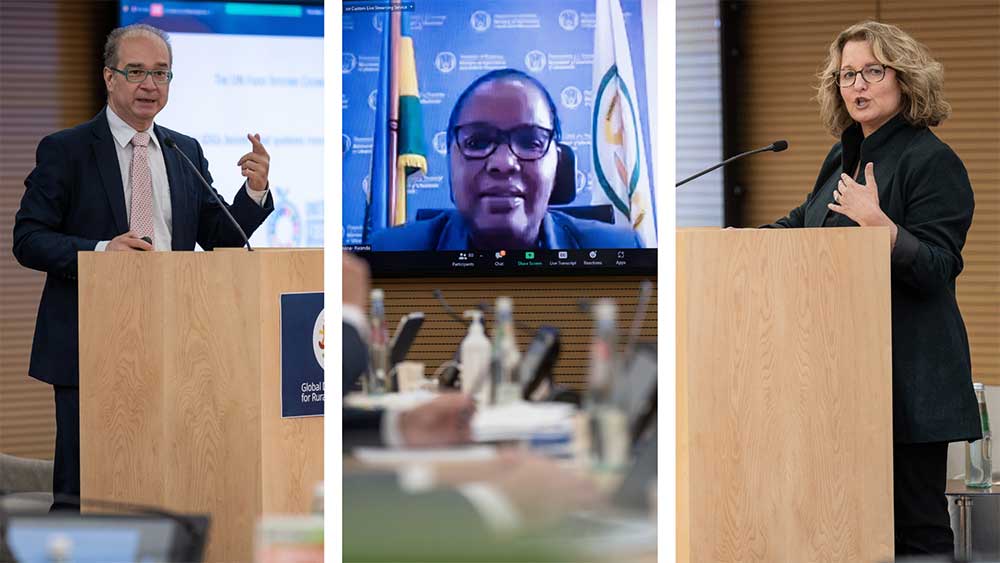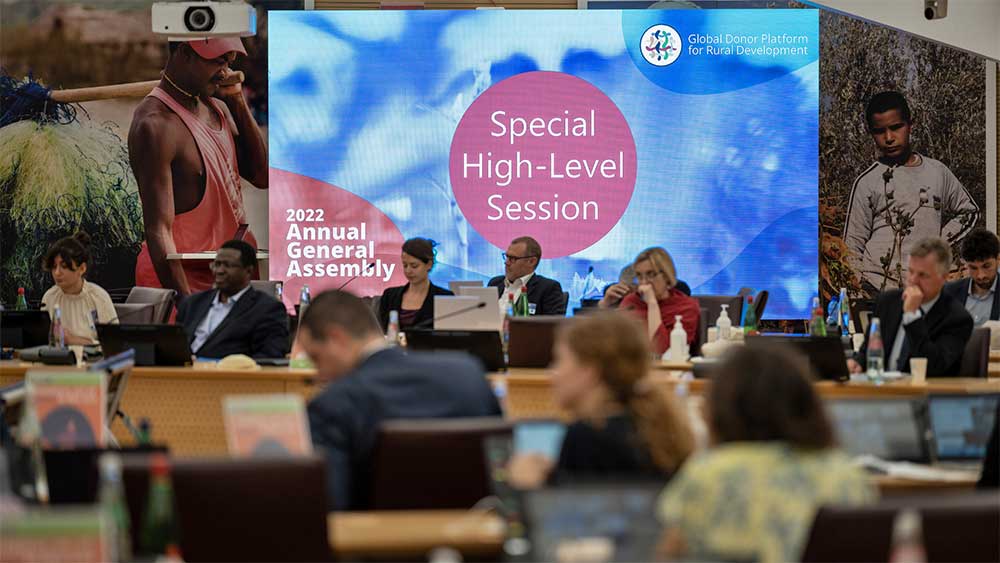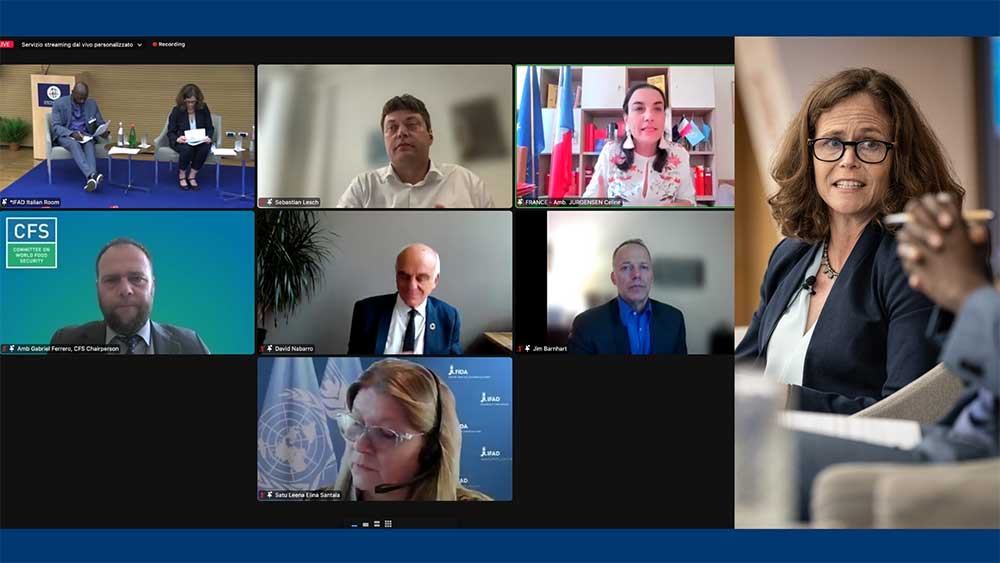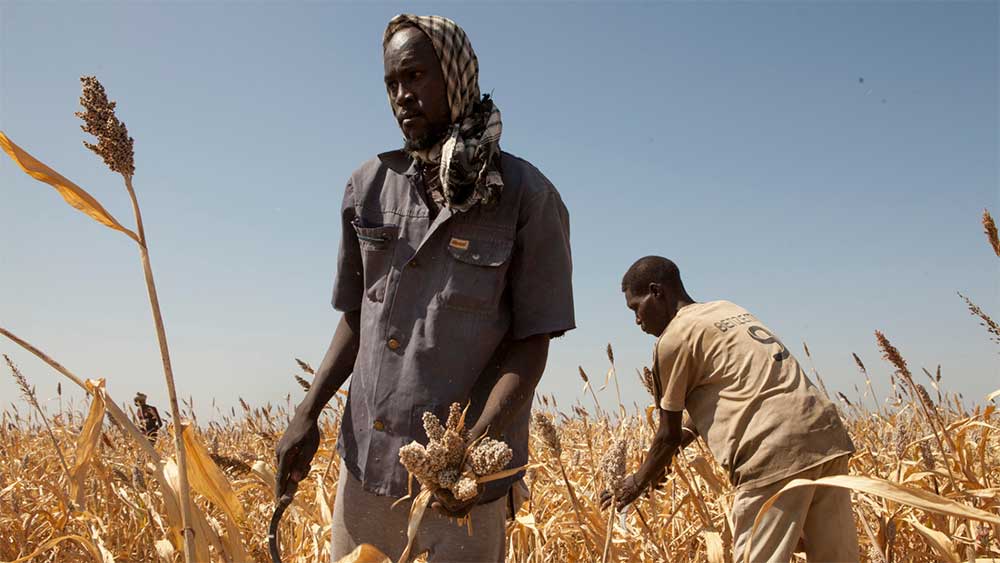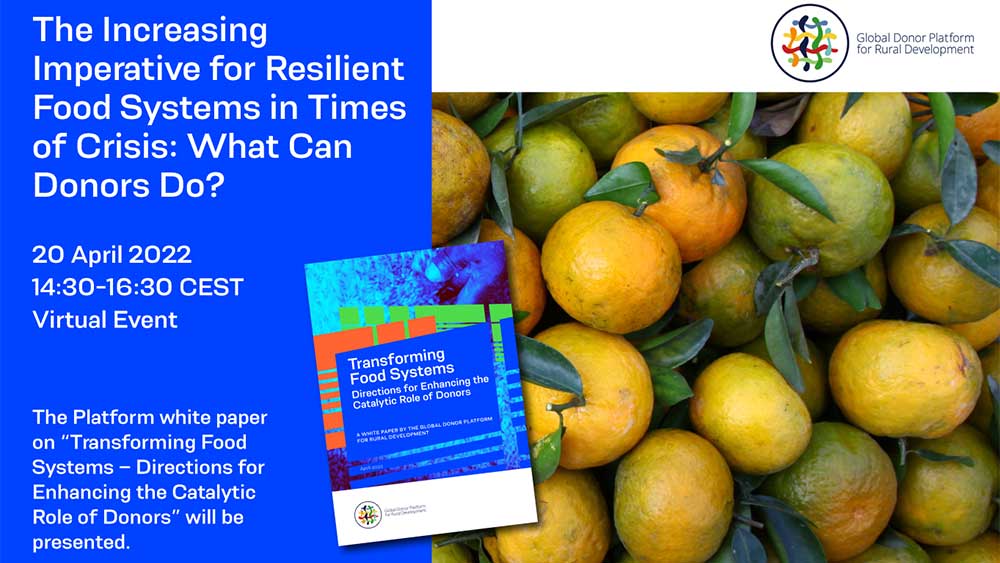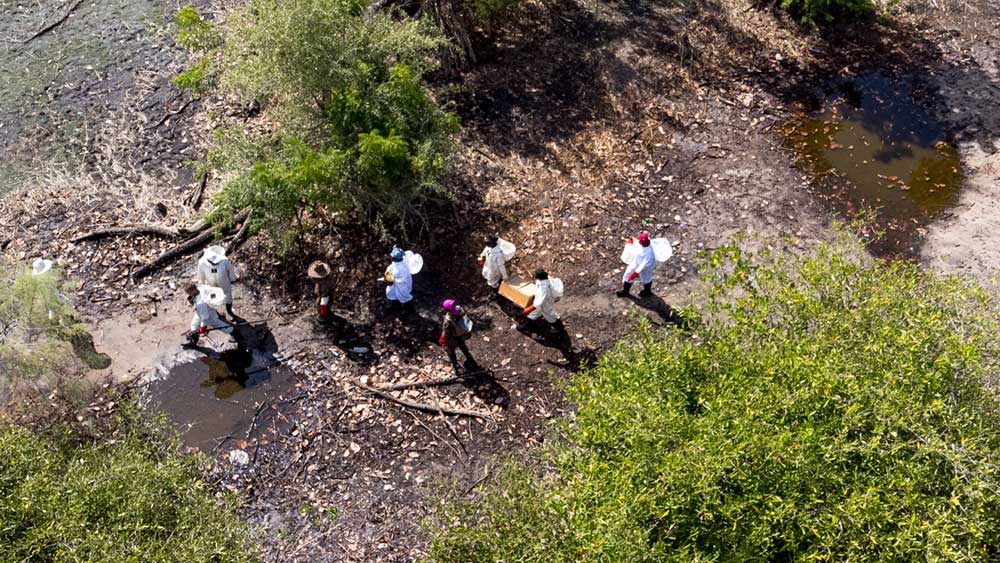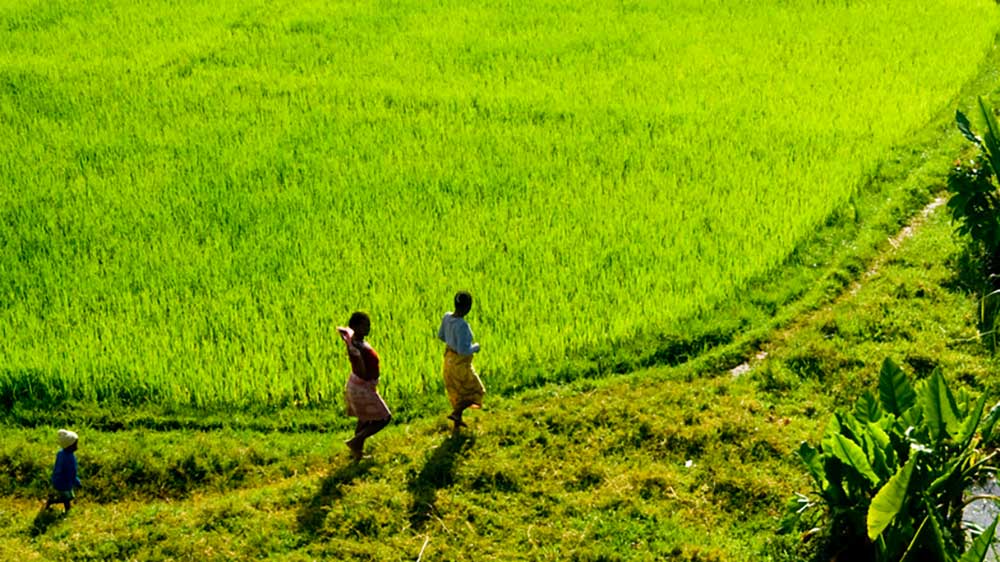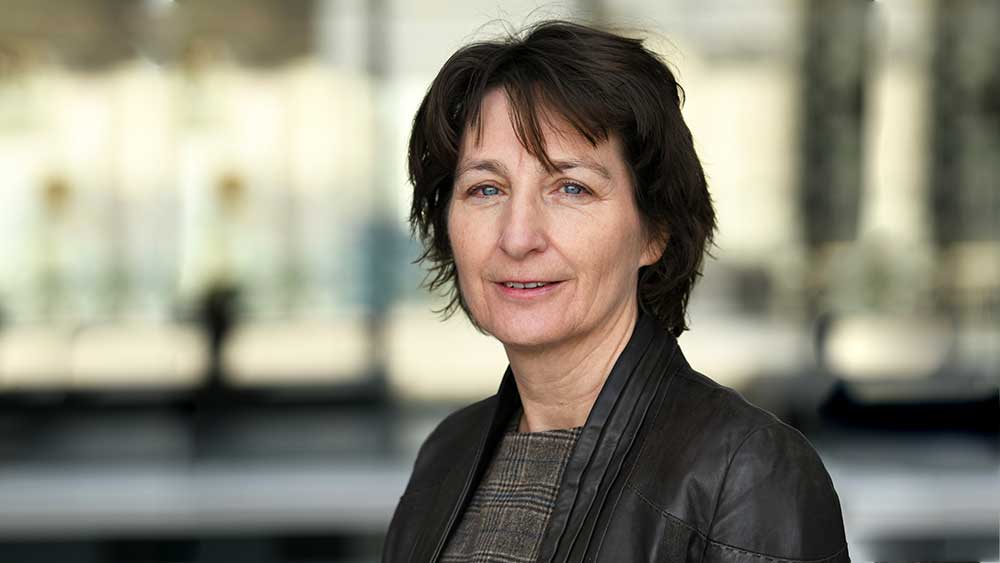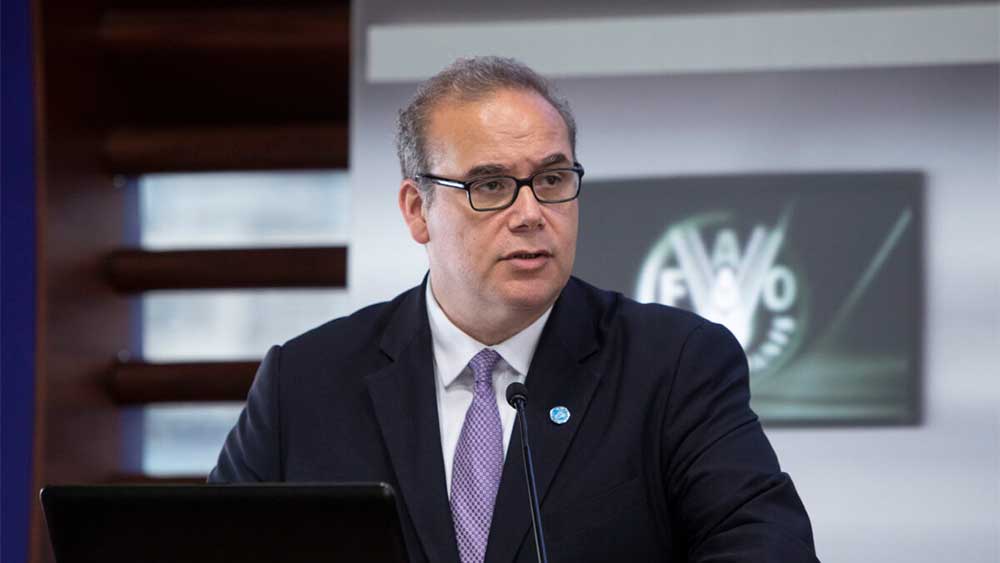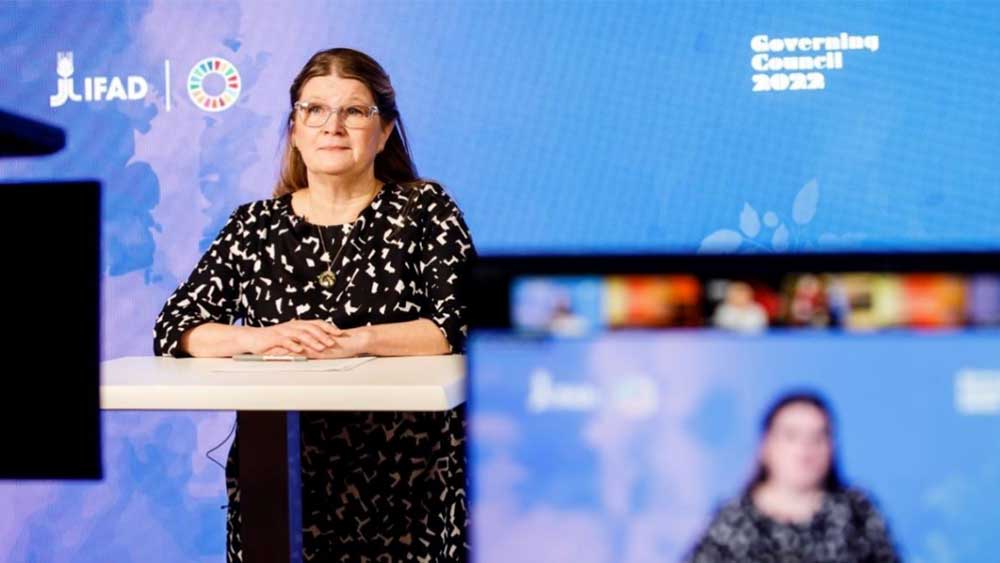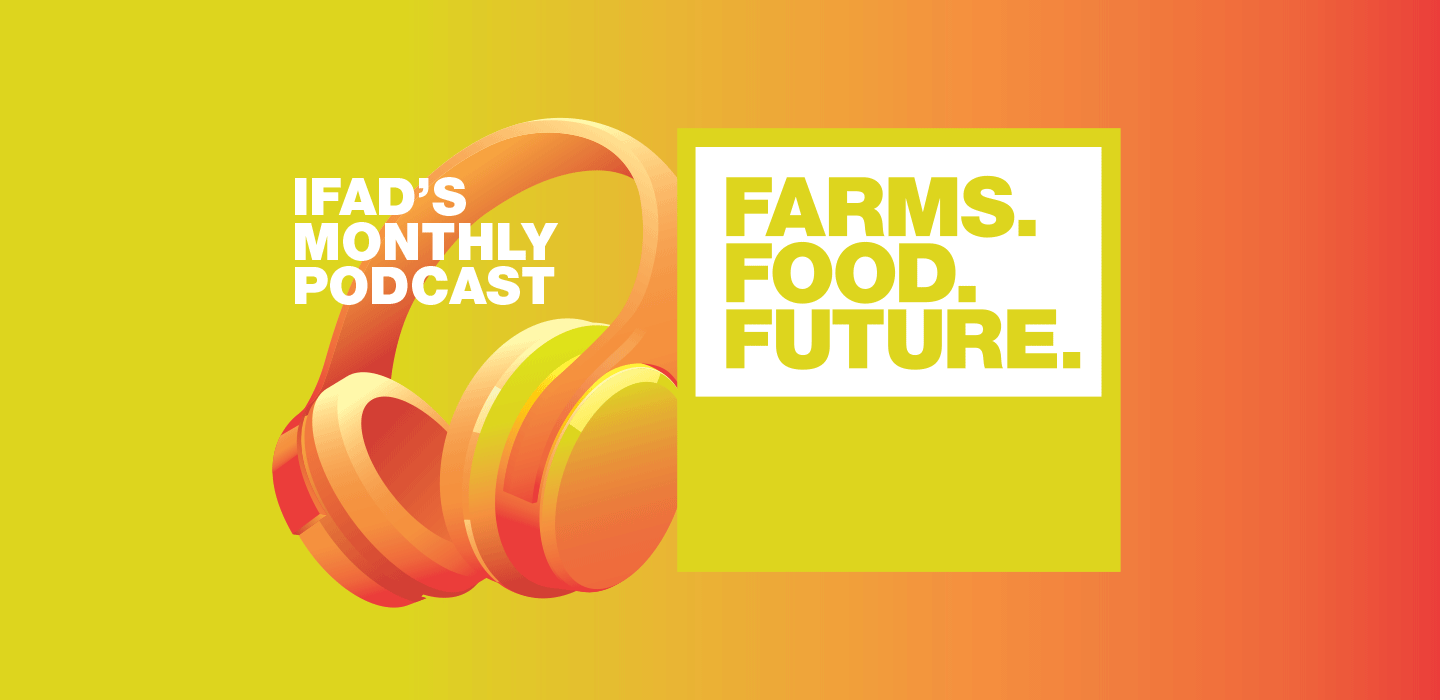# Recent Highlights #The 2022 Annual General Assembly
The 2022 Annual General Assembly (AGA) of the Global Donor Platform for Rural Development (GDPRD) convened on 14 and 15 June and was dedicated to “Implementing National Pathways for Food Systems Transformation to Accelerate Progress Towards the SDGs in Times of Crisis and Conflict”. The hybrid on site and online event, held at the Rome headquarters of the International Fund for Agricultural Development (IFAD), focused on five key themes for donors:
The AGA provides an open space for debate to members, partners and invited guests on emerging policy topics in agriculture and rural development. This year’s AGA made clear that there is no one-size-fits all solution for food systems transformation and highlighted the imperative for coherence and coordination among donors, but also among a wide variety of stakeholders. WEBLINK
Special High-Level AGA Session
“Building Consensus and Coordination on the Current Global Crisis Response Initiatives: The Potential Role of Donors and the Global Donor Platform for Rural Development” was a special session held on Day 2 of the AGA. The high-level panel included:
The discussion focused on the blend of mechanisms, risk assessments, and the role of donors in the global architecture to better coordinate the international initiatives working to support food security during the current crisis. The session was co-sponsored by the European Commission, the International Fund for Agricultural Development and the Global Donor Platform for Rural Development. WEBLINK
BOARD MEETING 16 June 2022 The Platform held its first hybrid Board meeting on 16 June 2022 at IFAD headquarters with a full day agenda. The meeting started off with a strategic conversation on the future orientation of the Platform, followed by a presentation and discussion on development of a stocktaking report on country-level coordination for national pathways. The Food Systems Coordination Hub joined with a presentation and a Q&A discussion. The meeting ended with updates from the Secretariat on the upcoming Senior Managers meeting, a horizon scan for 2022, and the new communications strategy and soon-to-be launched website. Donor Round Table: Addressing The Impacts Of The War In Ukraine On 3F (Food, Fuel, Fertilizer) Prices For Rural Small-Scale Producers
The GDPRD co-organized a virtual round table with the International Fund for Agricultural Development (IFAD) and the European Commission (EC) on “Addressing the Impacts of the War in Ukraine on 3F (Food, Fuel, Fertilizer) Prices for Rural Small-Scale Producers” on 20 May, 2022. The event provided an open space to discuss donor actions to support small-scale rural producers in the multi-layered crisis resulting from the Ukraine war. Overall, participants underlined that coordination and synchronization of initiatives are essential to avoid overlaps between interventions. Solutions need to be targeted and context-specific to meet emergency needs, while retaining a focus on medium- to long-term goals. The donor roundtable was just the beginning of this discussion on responses needed to support small-scale rural producers. WEBLINKHigh-Level Event: The Increasing Imperative For Resilient Food Systems In Times Of Crisis: What Can Donors Do?
On the heels of the pandemic, our collective attention is now focused on the skyrocketing food prices and the conflict in Ukraine. The GDPRD organised a high-level event in April to highlight the need for long-term investments in resilient food systems in order to combat and avoid such crises in the future. Jennifer Clapp, Professor of the University of Waterloo and Vice-Chair for the High-Level Panel of Experts on Food Security and Nutrition gave a keynote on how the conflict in Ukraine and the ongoing global food crisis are affecting food security well beyond the borders of Ukraine and Russia. Leonard Mizzi from the European Commission and Satu Santala from IFAD joined the panel discussion on the role of donors in these times of crises. Former Commissioner for Rural Economy and Agriculture for the African Union Commission, Rhoda Peace Tumusiime shared valuable insights on the topic as well. The Donor Platform WHITE PAPER on “Transforming Food Systems: Directions for Enhancing the Catalytic Role of Donors” was also presented during the event. WEBLINKWebinar: Green Jobs For Rural Youth In Agri-Food Systems
The Thematic Working Group on Rural Youth Employment (TWG RYE) has recently been exploring the topic of green jobs for youth. This ongoing conversation led to a webinar on “GREEN JOBS FOR RURAL YOUTH IN AGRI-FOOD SYSTEMS”, which took place on 25 April 2022, to discuss entry points for understanding green jobs in agri-food systems. The event was facilitated by Ji-Yeun Rim from OECD, with welcome and closing remarks by the Co-Chair Frank Bertelmann from GIZ. The webinar focused broadly on sustainable employment in the food sector and rural economies and facilitated an action-oriented exchange on existing experiences from the International Labour Organisation (ILO), the Food and Agriculture Organization of the UN (FAO) and other relevant stakeholders. WEBLINKGlobal Donor Working Group On Land CFS VGGT 10-Year Anniversary
This year, the global community celebrates the 10-year anniversary of the Voluntary Guidelines on the Responsible Governance of Tenure of Land, Fisheries and Forests (VGGT). These Guidelines, endorsed by members in 2012, represent a shared vision that enhancing the tenure security of the world’s women and men, including small farmers, Indigenous People and others facing situations of vulnerability, can improve lives and livelihoods. The Global Donor Working Group on Land (GDWGL) joins in the commemorations by sharing short testimonies from their Chair, Vice-Chair, members and partners, on what the VGGTs have meant to them. WEBLINK# Out Now #Interview: Why Partnerships And National Pathways Are Key To Transforming Food Systems In Times Of Crisis
The Secretariat had an insightful conversation with Wilma van Esch, Head of Food Security at the Netherlands Ministry of Foreign Affairs and International Cooperation, and GDPRD Board Member. Wilma has extensive experience in agriculture and development, having worked for both the ministry and the United Nations, in multiple positions and across many countries such as Ghana, India, Tanzania, and Kenya. WEBLINKInterview: Building Long-Term Resilience In Food Systems Is Key To Buffer Against Future Economic Shocks And Humanitarian Crises
Máximo Torero, FAO Chief Economist, spoke with Jim Woodhill on how our current food price crisis differs from previous crises and why strengthening our food systems resilience is important for both people and planet. Máximo also shared his fascinating career and range of experiences. WEBLINKOp-Ed: The Need For Better Donor Coordination: Building Long-Term Resilience Against Food Systems Crises
Satu Santala, Associate Vice President of the Department of External Relations and Governance (ERG) in IFAD shared her thoughts on donor coordination and the GDPRD white paper on transforming food systems and the role of donors in an Op-Ed on the IFAD blog in May. She emphasised the need for all stakeholders to cooperate and coordinate to ensure sustainability and inclusivity in food systems, underlining how short-term measures to address sudden crises should not compromise the long-term goals for food systems transformation. WEBLINKIfad Podcast: New Platform Miniseries
The GDPRD is adding its voice to the IFAD podcast in a miniseries and bringing a donor perspective to the frontline of food security. IFAD, as the host of the Platform secretariat, has created a special corner of conversation for our members and partners. "Farms. Food. Future." invites listeners to pull up a chair, sit down and tune in to the challenges that small-scale producers in developing countries are facing around food security. Listen to interviews with Platform Co-Chairs Tristan Armstrong and Conrad Rein, European Commission, Carin Smaller from the Ceres2030 team, Ammad Bahalim from the Gates Foundation, and Willem Olthof from the European Commission. WEBLINKNew Communications Strategy 2022–2025 This was approved by the Board in May 2022 and follows the principles of the Strategic Plan 2021-2025, which explicitly recognizes the role of communications and outreach in ensuring the Platform’s usefulness and relevance as a convenor and strategic influencer in the rural development and food systems nexus. The new strategy also responds to the Board’s calls to enhance the Secretariat’s capacity to produce sharper, more targeted and impactful communications. WEBLINK# News #A New Consensus With Small-Scale Food Producers Over the last few months, the SDG2 Advocacy Hub has been working with partners to explore how a new consensus, crafted and signed by smallholder farmers organizations, civil society, governments and international organizations, could contribute to and build on the momentum of the global summits. This concept has growing momentum cultivated through side-events organized by the Hub and its partners. The consensus aims to reinvigorate partnerships and coordinate efforts across all stakeholders to stand with smallholder farmers and to be accountable for tangible results. WEBLINKUrgent Action is needed to prevent a Global Food & Nutrition Crisis The SDG2 Advocacy Hub has gathered a set of asks for the G7 to act on the need for urgent action on the global food and nutrition crisis and to secure a sustainable future for people and the planet. A group of advocates have come together across Nutrition, Agriculture, Food systems and Climate to curate and rally around a set of asks of the G7. The asks are focused on the need for saving lives, building resilience and funding the future. WEBLINKFood Security: EU To Step Up Its Support To African, Caribbean And Pacific Countries In Response To Russia’s Invasion of Ukraine This report, launched by the Food and Agriculture Organisation (FAO), the UN Development Programme (UNDP) and the UN Environment Programme (UNEP) finds that 87% of current support to agricultural producers, approximately USD 540 billion per year, include measures that are often inefficient, inequitable, distort food prices, hurt people’s health, and degrade the environment. This report provides evidence on the benefits of repurposing negative agricultural support rather than eliminating it altogether. WEBLINKZEF Policy Brief No 40: Speculation Risks In Food Commodity Markets In The Context Of The 2022 Price Spikes – Implications For Policy This report, launched by the Food and Agriculture Organisation (FAO), the UN Development Programme (UNDP) and the UN Environment Programme (UNEP) finds that 87% of current support to agricultural producers, approximately USD 540 billion per year, include measures that are often inefficient, inequitable, distort food prices, hurt people’s health, and degrade the environment. This report provides evidence on the benefits of repurposing negative agricultural support rather than eliminating it altogether. WEBLINK# Coming Up in the GDPRD #Senior Managers Meeting The GDPRD will convene its second meeting with senior manager representatives from its Board in September/October, exact date to be decided. The purpose of this meeting is to provide continued strategic advice on directions and priorities for the Platform and to serve as a forum for discussions around emerging issues that require cross-donor alignment, collaboration and strategic influencing. Stocktaking Report On Country-Level Coordination The Platform has taken its work on food systems forward by focusing on national pathways through a donor-roundtable in December and the AGA entirely dedicated to spotlighting the importance of the country-level. The next step is to do a stocktaking on existing and former initiatives for donor coordination at the country-level and to look at how donors can support the implementation of the national pathway documents from the UN Food Systems Summit. The aim will be to identify good practices at the country-level as a learning exercise, which can inform donors on how to act going forward. Coming Up In Communications New post-event materials from the Annual General Assembly 2022 will be posted on the web page in the coming weeks, including the event report, presentations and interviews with some of our keynote speakers and panellists. Check our website over the summer months, for upcoming events and news from the Secretariat and Platform members and partners. A new website will be launched in the Fall 2022. This will include user-friendly navigation and knowledge and resource features. It will also incorporate the Platform’s modernized logo and visual identity elements. |
